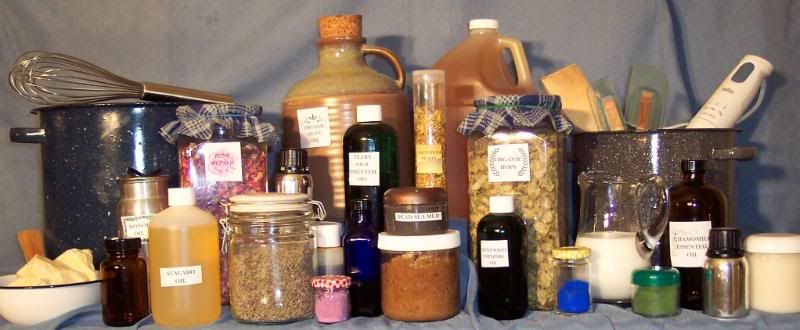First in a series of educational and informational blog posts about handmade soap by Bonnie Bartley, soapsmith.

Handmade soap is true soap in its purest form. True soap is the result of a chemical reaction, called saponification, between fatty acids and an alkali. Each oil, butter and fat has its own fatty acid profile that lends unique properties to the soap. For example, olive oil is high in oleic acid that is gentle to the skin, the lauric acid in coconut oil provides for a fluffy lather but can be stripping to dry skin conditions, palm oil offers palmitic acid that contributes to quality lather but is not as drying as coconut etc. The seasoned soap maker will use their expertise to balance the various fatty acid profiles of dozens of oils and butters to formulate a recipe that will achieve the desired results in the finished product.

Armed with the carefully crafted recipe, the superior ingredients are meticulously measured, using weights not volume, then combined with the precise amount of alkali that has been dissolved in water, milks or other liquids. The most common alkali is Sodium Hydroxide, also known as lye. Liquid soaps are usually made with Potassium Hydroxide, KOH. Many folks recall the harsh soap that Grandma made and mistakenly refer to them as Lye Soap. All soap is made with lye
NO LYE, NO SOAP...NO LIE!
Grandma's soap was often harsh because the soap making was done with outdated methods that lead to inaccurate measuring. Often, wood ash was boiled in water, or lye was added to the water until Granny could float an egg. That was the sign that the lye was strong enough. Leftover fats like lard, tallow and bacon grease were used to make the soap. Obviously, that method left a lot to be desired, resulting in an unpredictable end product could in fact be very harsh.
Commercial soaps are also made with lye, sodium hydroxide. Their ingredients are usually listed as sodium tallowate, sodium olivate, sodium palmate etc. That is the end product of lye (sodium hydroxide) mixed with the fats: tallow, olive oil, palm oil. Once the fatty acids combine with the alkali and the saponification process completes, you are left with molecules of soap and glycerin. Many commercial soaps add detergents as well. Commercial manufacturers often remove the glycerin and sell it as a by product. True soap, leaves the glycerin intact. This natural glycerin is beneficial in handmade soap. Handmade soap luxuriously cleans your skin without being harsh or drying.
Master handmade soap makers offer simple unscented and uncolored soaps, enhance their soap with pure natural essential oils, cosmetic grade fragrance oils, herbs, botanicals, and colorants to create uniquely sensuous delights to pamper your senses. You can find soaps made with traditional, vegan, organic, eco friendly and natural oils and butters.
Indulge yourself with the ultimate in affordable luxury...dim the lights, light candles, put on the music, draw a bath and relax with a bar of elegantly crafted handmade soap!
Thanks for visiting, have a great day,
Bonnie

No comments:
Post a Comment